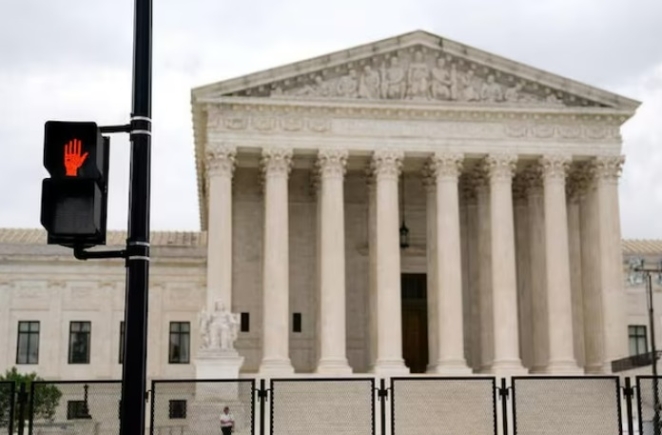The U.S. Supreme Court on Friday said the constitutional rights of U.S. citizens are not violated when the government bars their non-citizen spouses from entering the country without explanation.
The court in a 6-3 decision, opens new tab said Sandra Munoz, a U.S. citizen and civil rights lawyer, cannot challenge the U.S. Department of State's denial of her El Salvadoran husband's visa application after the agency waited three years to explain that it suspected him of being a gang member.
Munoz and her husband, who she married in 2010 and with whom she has a child, have been separated since 2015, according to court filings.
Visa denials are not reviewable in court unless the government violates an applicant's constitutional rights in the process.
The Supreme Court on Friday rejected Munoz's claim that the delay in explaining the denial violated her due process rights by interfering with her fundamental right to marry.
Her claim "involves more than marriage and more than spousal cohabitation — it includes the right to have her noncitizen husband enter (and remain in) the United States," Justice Amy Coney Barrett wrote for the court.
The ruling reverses a 2022 decision by the San Francisco-based 9th U.S. Circuit Court of Appeals that revived Munoz's lawsuit against the State Department.
Lawyers for Munoz and the U.S. Department of Justice did not immediately respond to requests for comment.
The Immigration Reform Law Institute, a conservative group that filed a brief backing the State Department, praised the ruling.
"To hold for this couple would let those Americans who choose to marry dangerous aliens force their choice on the rest of us," Dale Wilcox, the group's executive director and general counsel, said in a statement.
Munoz sued the State Department in 2017 after the agency declined to reconsider its earlier denial of her husband's visa, and before it explained its determination. Munoz's husband, who has no criminal record and denied any gang affiliation, had traveled to El Salvador to apply for a visa.
A federal judge in Los Angeles ruled in 2021 that the State Department was not obligated to notify Munoz of its reasons for denying the application. The 9th Circuit in 2022 reversed, saying that Munoz could not effectively challenge the decision without being informed of its factual basis, which violated her due process rights.
But the Supreme Court on Friday said Munoz's constitutional right to marry did not equate to a right to have her husband live with her in the United States.
Justice Sonia Sotomayor in dissent said the decision was inconsistent with decades of Supreme Court precedent that recognized the importance of marriage, including seminal rulings prohibiting state bans on interracial and gay marriage and the 1973 Roe v. Wade decision, which invoked the right to marry as the foundation underlying a constitutional right to abortion. The court overturned Roe v. Wade two years ago.
"There is no question that excluding a citizen’s spouse burdens her right to marriage, and that burden requires the Government to provide at least a factual basis for its decision," Sotomayor wrote, joined by Justices Elena Kagan and Ketanji Brown Jackson.
The case is Department of State v. Munoz, U.S. Supreme Court, No. 23-334.
For the State Department: Deputy Solicitor General Curtis Gannon
For Munoz: Eric Lee of Diamante Law Group

